Laxmikanth Summary: Central Council of Ministers | Indian Polity for UPSC CSE PDF Download
Introduction
- The Council of Ministers headed by the PM serves as the Real Executive Authority.
- The principles of the Parliamentary System & the functioning of the Council of Ministers are not discussed in detail in the Constitution.
- Articles 74 & 75 of the Constitution give a broad & sketchy description of the functioning of the Council of Ministers.
- Article 74 deals with the status of the Council of Ministers while Article 75 deals with the appointment, tenure, responsibility, qualification, oath, and salaries and allowances of the ministers.
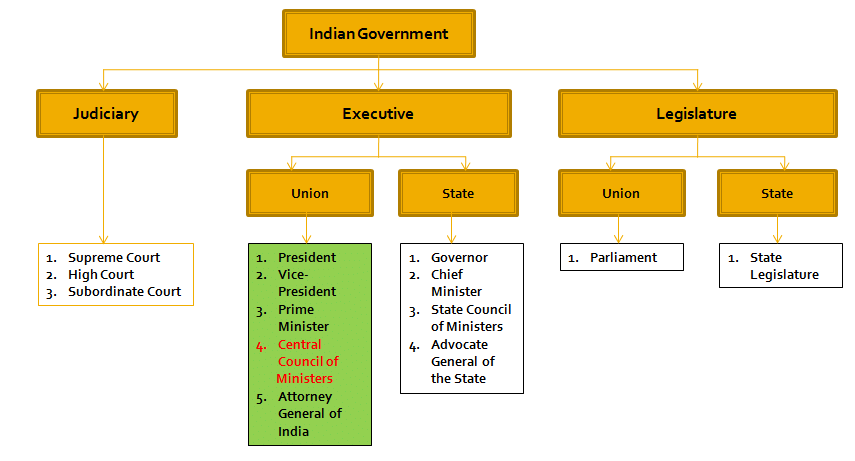
Constitutional Provisions
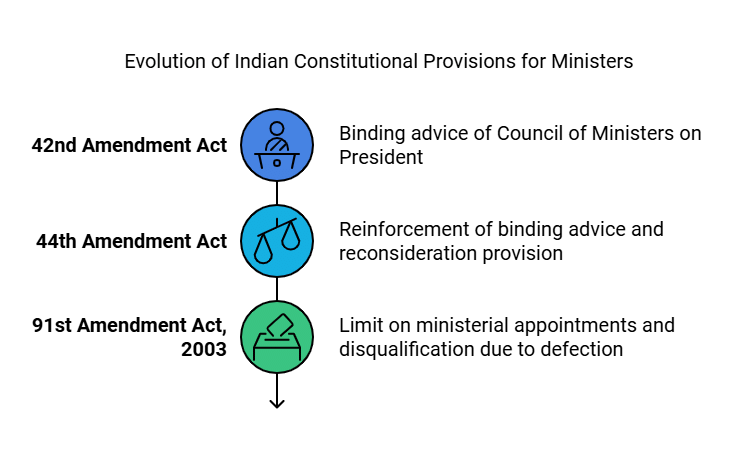
Article 74: Council of Ministers to aid and advise President
Provides for the Council of Ministers headed by Prime Minister.
- Article 74 provides for a council of ministers with the Prime Minister at the head to aid and advise the President in the exercise of his functions.
- The 42nd and 44th Constitutional Amendment Acts have made the advice binding on the President.
- All Aid & advice by the Council of Ministers is made binding on the President, with a provision for the President to return advice for reconsideration to the Council of Ministers once.
- The advice of the Council of Ministers to the President cannot be judicially reviewed.
Article 75: Other Provisions as to Ministers
Provides for the Composition & other broad details.
- The Prime Minister is appointed by the President, and other ministers are appointed by the President based on the Prime Minister's advice.
- The total number of ministers, including the Prime Minister, cannot exceed 15% of the total strength of the Lok Sabha. This rule was added by the 91st Amendment Act, 2003.
- Any member of Parliament disqualified due to defection (switching political parties) cannot be appointed as a minister. This was also added by the 91st Amendment Act, 2003.
- Ministers hold office at the pleasure of the President.
- The Council of Ministers is collectively responsible to the Lok Sabha.
- The President administers the oaths of office and secrecy to ministers.
- A minister who is not a member of Parliament (either House) for six consecutive months will lose their position as a minister.
- The salaries and allowances of ministers are decided by Parliament.
Article 77: Conduct of Business of the Government of India
Conduct of Business of the Government of India.
- All executive action of the Union is to be taken in the name of the President.
- The manner of authentication of Orders and exec actions taken in the name of Prez shall be laid down by the President himself. Such authentication cannot be judicially reviewed.
- President shall make rules for the transaction of business of Govt of India & allocation of the said business among ministers.
Article 78: Duties of Prime Minister
Deals with Duties of Prime Minister
- It includes the duty to relay the decisions of the CoM to the President.
- It also includes the duty to submit a decision of a Minister for consideration to the CoM when the President requires so.
Article 88: Right of Ministers as Respects the Houses
Rights of Ministers as Respects the Houses
- Every Minister shall have the right to participate & speak in the proceedings of either House of Parliament or in a Joint Sitting of Parliament or in any Parliamentary committees whether he or she is a member of that House or of Parliament or not.
- However, a Minister will only be able to vote on an issue in the House that he is a part of. Non-MP Ministers will not vote.
Nature of Advice By Ministers
Article 74 provides for a Council of Ministers with the Prime Minister at the head to aid and advise the President in performing their functions.
The 42nd and 44th Constitutional Amendment Acts made the advice of the Council of Ministers binding on the President.
The nature of advice given by ministers to the President cannot be questioned in any court. This emphasizes the confidential relationship between the President and the ministers.
In the V.N. Rao case (1971), the Supreme Court ruled that even after the dissolution of the Lok Sabha, the Council of Ministers continued to hold office.
- The President cannot exercise executive powers without the Council’s advice, as this would violate Article 74.
In the Shamsher Singh case (1974), the Supreme Court clarified that when the Constitution mentions the satisfaction of the President, it refers to the satisfaction of the Council of Ministers, not the President’s satisfaction.
Appointment of Ministers
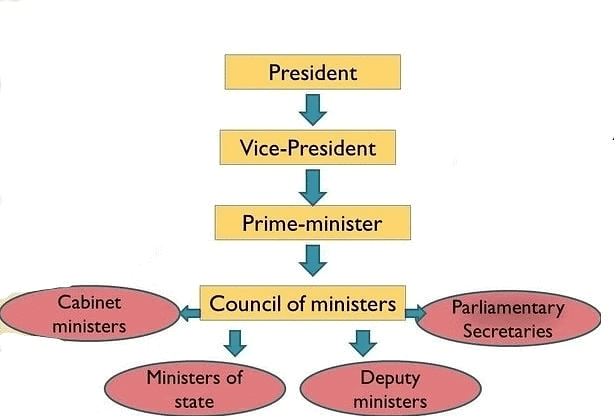
- The Prime Minister is appointed by the President, while the other ministers are appointed by the President on the advice of the Prime Minister.
- This means that the President can appoint only those persons as ministers who are recommended by the Prime Minister.
Oath and Salary of Ministers
Before a minister takes office, the President administers the oaths of office and secrecy.
In the oath of office, the minister swears to:
- Be loyal to the Constitution of India.
- Uphold India’s sovereignty and integrity.
- Faithfully discharge the duties of the office.
- Do right by all people according to the Constitution and law, without bias.
In the oath of secrecy, the minister swears not to reveal any confidential matters learned during their time as a Union minister, except as required for their duties.
In 1990, a challenge was made to Devi Lal's oath as Deputy Prime Minister, arguing it was unconstitutional because the Constitution only mentions the Prime Minister and ministers.
- The Supreme Court upheld the oath, stating that titles like Deputy Prime Minister or minister of state are merely descriptive and do not affect the validity of the oath.
The salaries and allowances of ministers are determined by Parliament.
- A minister receives the salary of a Member of Parliament plus additional allowances based on rank, such as sumptuary allowance, accommodation, travel, and medical facilities.
- In 2001, the sumptuary allowance for various ministers was increased (e.g., Prime Minister’s from ₹1,500 to ₹3,000, Cabinet Minister’s from ₹1,000 to ₹2,000, etc.).
Responsibility of Ministers
Collective Responsibility
- Article 75 clearly states that the council of ministers is collectively responsible to the Lok Sabha.
- This means that all the ministers own joint responsibility to the Lok Sabha for all their acts of commission and commission.
- They work as a team and swim or sink together.
- When the Lok Sabha passes a no-confidence motion against the council of ministers, all the ministers have to resign including those ministers who are from the Rajya Sabha.
Individual Responsibility
- Article 75 also contains the principle of individual responsibility.
- It states that the ministers hold office during the pleasure of the president, which means that the President can remove a minister even at a time when the council of ministers enjoys the confidence of the Lok Sabha.
No Legal Responsibility
- The courts are barred from inquiring into the nature of the advice tendered to the Prez by the CoM.
- Therefore such advice cannot be challenged in court.
- The CoM holds no legal responsibility if any advice violates the law.
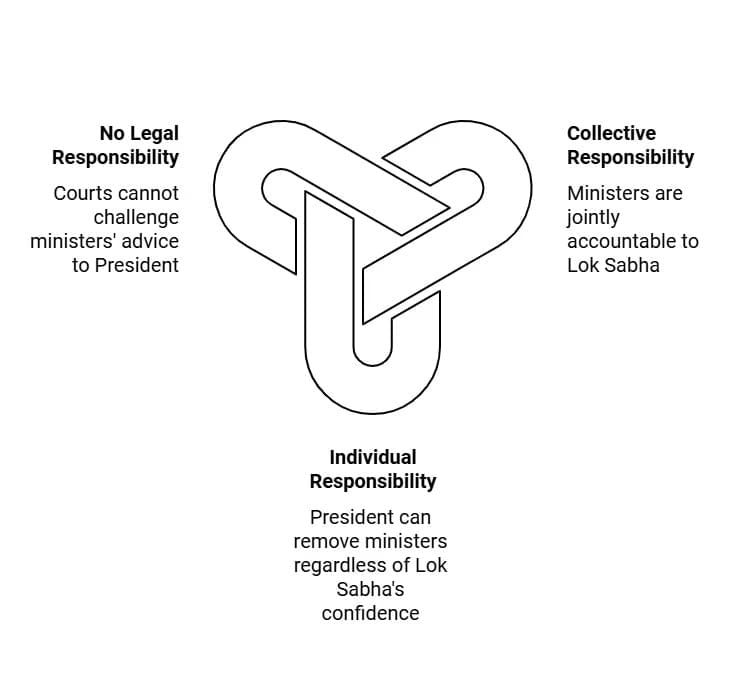
Composition of the Council of Ministers
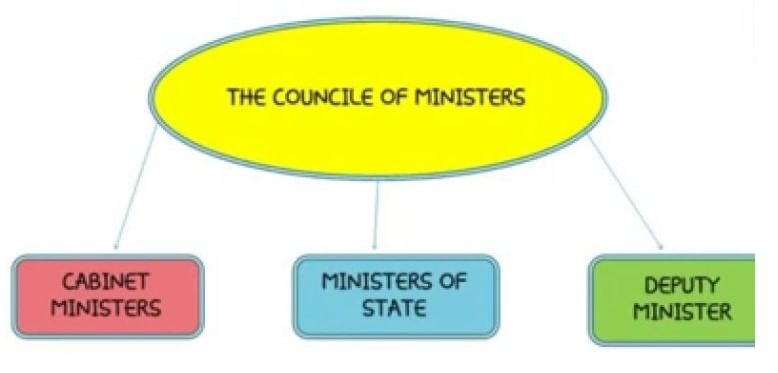
The council of ministers consists of three categories of ministers, namely, cabinet ministers, ministers of state, and deputy ministers.
- Cabinet Ministers:Hold Important portfolios & head important Ministries like Home, Defence, External Affairs, etc. A smaller unit within CoM that meets regularly & makes most decisions.
- Ministers of State:Can be attached to Cabinet Ministers as subordinates or can also have independent charges of ministry or departments.
- Deputy Ministers: They are attached to Cabinet Ministers or MoS as subordinates, assisting in their admin, political, & parliamentary duties.
- Parliamentary Secretary is one more rank in CoM. They are attached to Senior ministers & help them in discharging parliamentary duties. No parliamentary secretaries have been appointed since 1967.
- Prime Minister is also a part of CoM as its head. Deputy PM (if nominated by PM) is also a part of the CoM.
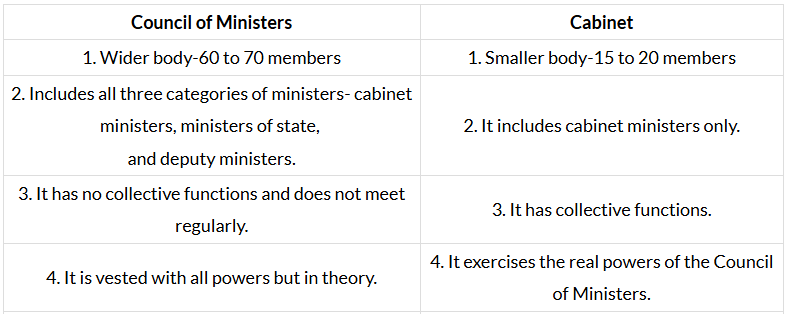
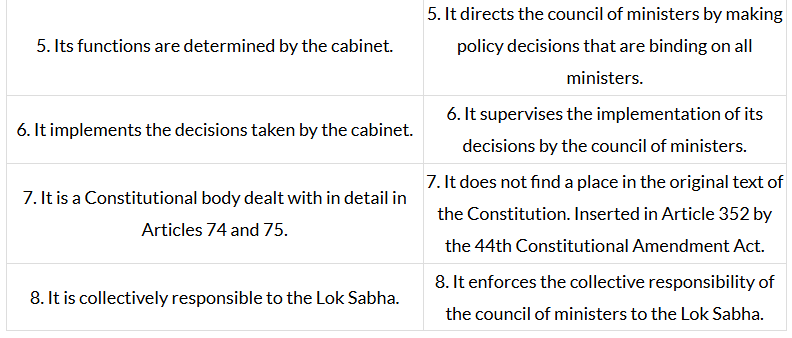
Council of Ministers VS Cabinet
The terms 'Council of Ministers' and 'Cabinet' are often used interchangeably, but there is a clear distinction between them. They differ in terms of as explained above in tabular form.
- Composition (who is included),
- Functions (what they do),
- Role (their responsibilities).
Role of Cabinet
- It is the highest decision-making authority in our political-administrative system.
- It is the chief policy-formulating body of the Central government.
- It is the supreme executive authority of the Central government.
- It is the chief coordinator of Central administration.
- It is an advisory body to the president and its advice is binding on him.
- It is the chief crisis manager and thus deals with all emergencies.
- It deals with all major legislative and financial matters.
- It deals with all foreign policies and foreign affairs.
Role Descriptions
Various eminent political scientists and constitutional experts have made comments about the role of the Cabinet in Britain, which are also applicable to the Indian context. Some of these comments are:
- Ramsay Muir: "The Cabinet is the steering wheel of the ship of the state."
- Lowell: "The Cabinet is the keystone of the political arch."
- Sir John Marriott: "The Cabinet is the pivot around which the whole political machinery revolves."
- Gladstone: "The Cabinet is the solar orb around which the other bodies revolve."
- Barker: "The Cabinet is the magnet of policy."
- Bagehot: "The Cabinet is a hyphen that joins, the buckle that binds the executive and legislative departments together."
- Sir Ivor Jennings: "The Cabinet is the core of the British Constitutional System. It provides unity to the British system of Government."
- L.S. Amery: "The Cabinet is the central directing instrument of Government."
The position of the Cabinet in the British Government has become so powerful that Ramsay Muir referred to it as the "Dictatorship of the Cabinet." In his book How Britain is Governed, he states that the Cabinet, with its immense powers, may be considered 'omnipotent' in theory, though its use of power may be limited. This position, when the Cabinet commands a majority, is essentially a dictatorship, qualified only by publicity. This description is equally relevant in the Indian context.
Kitchen Cabinet
The Cabinet, which consists of the Prime Minister and Cabinet Ministers, is the highest decision-making body in India in a formal sense. However, a smaller and more informal body, known as the 'Inner Cabinet' or 'Kitchen Cabinet', has become the real center of power. This group includes the Prime Minister and a few trusted colleagues, sometimes even friends and family, who assist in making important political and administrative decisions.
The 'Inner Cabinet' is often preferred for the following reasons:
- It is a small and efficient decision-making body compared to the large cabinet.
- It can meet more often and make decisions quickly.
- It helps the Prime Minister maintain secrecy when making important decisions.
However, it also has some demerits:
- It reduces the authority and status of the formal Cabinet.
- It circumvents the legal process by allowing outside persons to influence government decisions.
The concept of a 'Kitchen Cabinet' is not unique to India; it also exists in countries like the USA and Britain, where it plays a significant role in influencing government decisions.
|
142 videos|779 docs|202 tests
|
FAQs on Laxmikanth Summary: Central Council of Ministers - Indian Polity for UPSC CSE
| 1. What are the constitutional provisions related to the Council of Ministers in India? |  |
| 2. How is the Prime Minister appointed and what is the role of the Council of Ministers? |  |
| 3. What is the difference between the Council of Ministers and the Cabinet? |  |
| 4. What is the oath taken by ministers in India? |  |
| 5. What responsibilities do ministers have in the Indian government? |  |






















